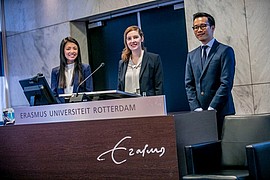PhD Defence: Anika Stuppy

In her dissertation ‘Essays on Product Quality', Anika Stuppy extends existing knowledge on the perception and pursuit of product quality.
Anika Stuppy defended her dissertation in the Senate Hall at Erasmus University Rotterdam on Thursday, October 18 at 11:30. Her supervisors were Dr. Nicole Mead (The University of Melbourne) and Prof. Stijn van Osselaer (Cornell University). Other members of the Doctoral Committee are Prof. Ale Smidts (RSM), Dr.Bram Van den Bergh (RSM), Prof. Stefano Puntoni (RSM), Prof. Luk Warlop (BI Oslo), Dr. Femke van Horen (FU Amsterdam) and Prof. Peeter Verlegh (FU Amsterdam).
About Anika Stuppy

Anika Stuppy was born in Landstuhl, Germany on January 23rd 1987. She received her Diploma (Master equivalent) in Psychology from the University or Cologne, Germany. In 2013, she started her Ph.D research in Marketing at the Erasmus Research Institute in Management. Her main research interests concern perceived product quality and hedonic enjoyment. Within this domain, she pursues several streams of research. In one project, Anika examines why consumers with negative self-views sometimes choose to consume inferior products. Another project decodes how consumers’ present hedonic enjoyment is shaped by their past experiences in a product domain. In a third stream of research, she examines consumers’ enjoyment of entertainment media. Anika has published her work in the Journal of Experimental Psychology: General and the Marketing Science Institute Working Paper series. She has also presented her research at numerous international conferences (e.g., the Association for Consumer Research, Society for Consumer Psychology, and European Marketing Academy). Between August 2015 and December 2015, she was a visiting research scholar at the Leeds School of Business, University of Colorado at Boulder. In September 2018, Anika started working as an Assistant Professor in Marketing at Tilburg University, the Netherlands.
Thesis Abstract

This dissertation aims to advance our understanding of sustainability management by leveraging a systems thinking lens. In Chapter 1, I introduce corporate sustainability research to position the contribution of this dissertation. Chapter 2 reviewed the literature at the intersection of sustainability management and a systems perspective. We identified and described 5 core theoretical concepts (interconnections, feedbacks, adaptive capacity, emergence and self-organization) and 9 research themes (behavioral change, leadership, innovation, industrial ecology, social-ecological systems, transitions management, paradigm shifts and sustainability education). Chapter 3 argued that the existing literature on resilience in management journals focuses primarily on the resilience at the organizational level, and develops a cross-scale perspective. Chapter 4 proposed that that organizational studies of risk can benefit from natural science insights on systemic ecosystem risks at the planetary scale and develops a three-phase framework for understanding systemic ecosystem risks. Chapter 5 draws on a qualitative ethnography to understand how social-ecological sustainability frameworks are utilized as a systemic basis for collective strategic planning and communication in a global business association. Chapter 6 concludes the dissertation by providing a synthesis of the chapters and managerial implications.
Photos: Chris Gorzeman / Capital Images


